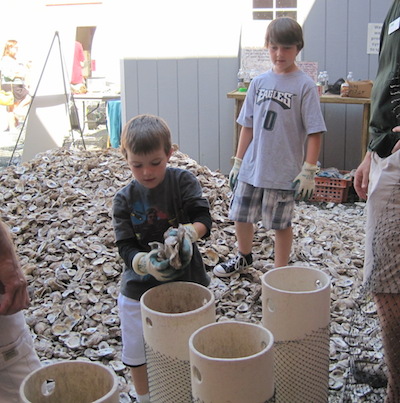CAMBRIDGE, MD (October 6, 2014)–The Horn Point Laboratory invites the public to take part in its annual free Open House from 10:00 a.m. to 3:00 p.m. on Saturday, October 11, 2014. Located on the banks of the Choptank River on Maryland's Eastern Shore, the laboratory is renowned for its study of marine ecosystems. The theme for this year’s event is “Travel the Bay with Science.” It features exhibits by the laboratory’s scientists of their investigations in the Chesapeake Bay and coastal areas along the Atlantic Coast.
“This is the best day of the year for the community to learn about the science of the Chesapeake Bay,” said Horn Point Laboratory Director Mike Roman. “Everyone at the lab is on deck to explain their research with activities and displays. Our travel theme this year will visually take our visitors to research sites around the Bay from Havre de Grace to Oxford.”
 Learn about research onsea grasses near Havre de Grace, Maryland, and marshes close to Alexandria, Virginia.
Learn about research onsea grasses near Havre de Grace, Maryland, and marshes close to Alexandria, Virginia.
- See demonstrations of water quality researchrelated to lawns and farms outside of Greensboro, located on the Eastern Shore.
- Experience the story of oysters that are spawned at the oyster culture facility at Horn Point and transported to Harris Creek near Bozman, outside of St. Michaels, Maryland.
- Investigate how oyster larvae move around the Bay from samples taken from locations like Oxford, Maryland, on the Eastern Shore.
- See an underwater glider that is deployed from Ocean City, Maryland, to track hurricanes in the Atlantic Ocean when the sea is too dangerous for research vessels.
- At the children’s activity booth, make a sea turtle and play games that teach fun facts about the Chesapeake Bay.
The open house is designed to interest all ages and will take place rain or shine. The Horn Point Laboratory campus is located 2020 Horns Point Road on Route 343 outside of Cambridge, Maryland. For more information, visit umces.edu/hpl/openhouse or contact Liz Freedlander at lfreedlander@umces.edu.
Part of the University of Maryland Center for Environmental Science’s statewide network of research centers, the Horn Point Laboratory on Maryland's Eastern Shore, has advanced society’s understanding of the world’s estuarine and ocean ecosystems. Horn Point scientists are world- respected for their interdisciplinary programs in oceanography, water quality, restoration of sea grasses, marshes and shellfish, and investigations of sea level rise and storm surge.
UNIVERSITY OF MARYLAND CENTER FOR ENVIRONMENTAL SCIENCE
The University of Maryland Center for Environmental Science unleashes the power of science to transform the way society understands and manages the environment. By conducting cutting-edge research into today's most pressing environmental problems and training the next generation of environmental scientists, we are developing new ideas to help guide our state, nation, and world toward a more sustainable future. From the mountains to the sea, our five research centers include the Appalachian Laboratory in Frostburg, the Chesapeake Biological Laboratory in Solomons, the Horn Point Laboratory in Cambridge, the Institute of Marine and Environmental Technology in Baltimore, and the Maryland Sea Grant College in College Park. www.umces.edu
# # #
